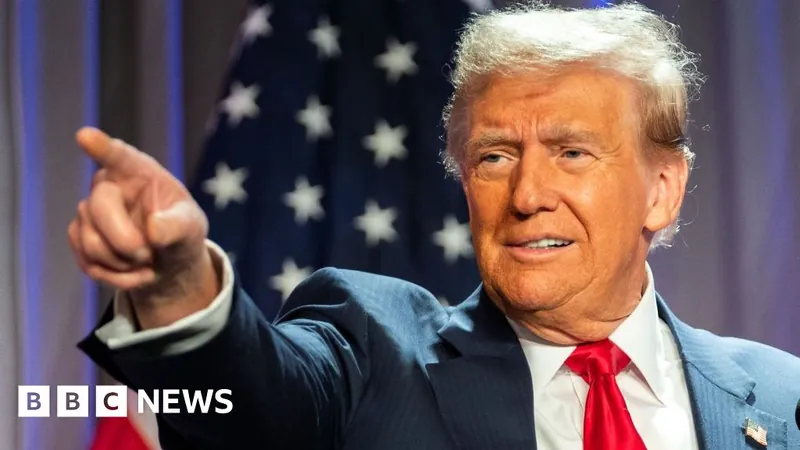
Trump’s Bold Threat: 100% Tariffs on BRICS or Else!
2024-12-02
Author: Lok
Trump’s Bold Threat: 100% Tariffs on BRICS or Else!
Former President Donald Trump has stirred the global economic waters once again, announcing his intention to impose a staggering 100% tariff on the BRICS nations if they dare to develop a rival currency to the US dollar.
In a fiery post on his social media platform, Truth Social, Trump declared, “The idea that the BRICS countries are trying to move away from the Dollar while we stand by and watch is OVER.” The BRICS alliance comprises emerging economies—Brazil, Russia, India, China, South Africa, as well as Iran, Egypt, Ethiopia, and the United Arab Emirates—that have been flirting with the idea of decreasing their reliance on the dollar in international trade.
This bold stance from Trump, who is set to assume office again on January 20, signals his commitment to reshaping trade dynamics. During his previous term, he was known for a penchant for imposing high tariffs, a topic he has increasingly brought back into discussions, especially in the context of global power shifts.
Initial discussions among BRICS leaders, especially from Brazil and Russia, point towards creating a shared currency. However, these talks have faltered due to internal disagreements among the member nations. Trump clearly stated that without a commitment from BRICS countries to abandon any plans for a new currency, they could expect significant penalties: “They can go find another sucker,” he remarked, portraying a tough stance that could push these nations towards careful consideration of their financial strategies.
Interestingly, some of Trump's allies view his tariff threats as a custom negotiating tactic, designed to position him favorably in discussions rather than as definitive policy statements. Republican Senator Ted Cruz emphasized the importance of leveraging tariffs as a negotiating tool, recalling how threats against Mexico and Canada initiated concrete responses.
This economic chess game is not limited to currencies. Just last week, Canadian Prime Minister Justin Trudeau made an unexpected trip to Trump’s Mar-a-Lago estate to address looming concerns about a potential 25% tariff on Canadian goods. This urgency underscores the tangible impacts tariffs impose on international relationships and trade agreements.
Additionally, Trump's choice for Treasury Secretary, Scott Bessent, has framed Trump’s tariff threats within a broader strategy. He suggests that Trump’s method often involves escalating rhetoric to achieve de-escalation in negotiations, a mindset that presents tariffs as a tool for economic advantage.
Tariffs, serving as domestic taxes on imports, could drastically reshape what consumers pay for goods. For instance, a vehicle worth $50,000 could face an additional $12,500 charge under a 25% tariff. While Trump argues that tariffs will not burden American consumers—claiming the cost will fall on foreign exporters—economists across the board suggest this notion is misleading, as these charges are initially absorbed by domestic importers.
Trump’s previous administration implemented numerous tariffs, many of which have persisted under President Biden, burdening consumers in the process. Economic studies indicate that the majority of the financial implications of these taxes have ultimately fallen on US consumers, leading to an ongoing debate about the long-term effects of such trade policies.
As the world watches Trump's latest move, the implications for global finance and the balance of economic power hang precariously in the air. Will the BRIC nations reconsider their strategies, or will Trump’s threats lead to a dramatic increase in economic tensions? Only time will tell.


 Brasil (PT)
Brasil (PT)
 Canada (EN)
Canada (EN)
 Chile (ES)
Chile (ES)
 España (ES)
España (ES)
 France (FR)
France (FR)
 Hong Kong (EN)
Hong Kong (EN)
 Italia (IT)
Italia (IT)
 日本 (JA)
日本 (JA)
 Magyarország (HU)
Magyarország (HU)
 Norge (NO)
Norge (NO)
 Polska (PL)
Polska (PL)
 Schweiz (DE)
Schweiz (DE)
 Singapore (EN)
Singapore (EN)
 Sverige (SV)
Sverige (SV)
 Suomi (FI)
Suomi (FI)
 Türkiye (TR)
Türkiye (TR)